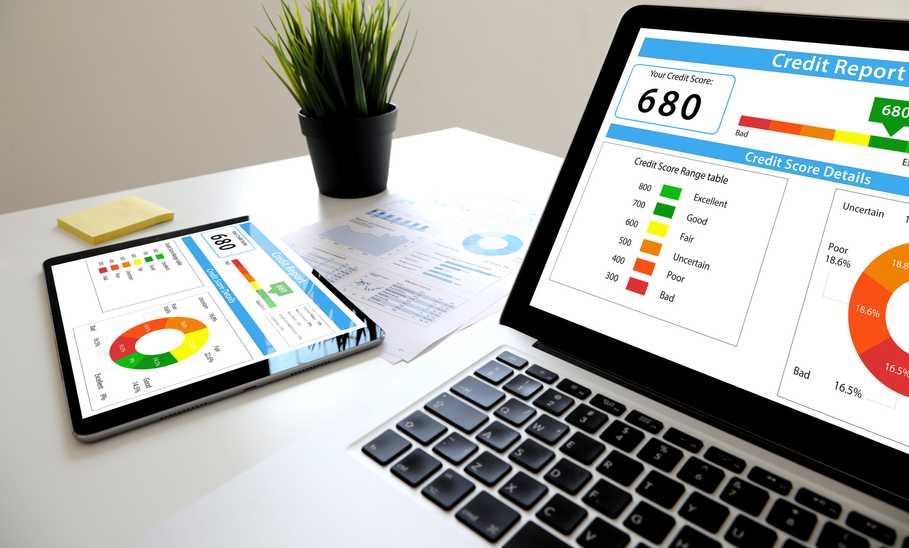Bad Credit: Definition, Impact and How To Improve

Our evaluations and opinions are not influenced by our advertising relationships, but we may earn a commission from our partners’ links. This content is created by TIME Stamped, under TIME’s direction and produced in accordance with TIME’s editorial guidelines and overseen by TIME’s editorial staff. Learn more about it.
Having a bad credit score isn’t the end of the world. Poor credit can make getting approval for a loan or credit card hard, but rebuilding your credit is possible. And you don’t have to live with a bad credit score for long; you can repair your credit score in around a year if you vow to pay your bills on time, limit unnecessary expenses, and utilize tools designed to improve creditworthiness.
Credit scores might look like three innocent numbers, but they can impact your life in various ways. A lender will review your credit score when you apply for a loan or line of credit, and a bad score could either result in an extremely high interest rate or your application getting rejected.
A prospective employer will typically review your credit score to determine whether you are responsible and trustworthy. A landlord will often run a credit check on you as part of a background check when you apply to rent an apartment or house. A bad credit score can affect all of these and more. But what is a bad credit score?
Two major companies assign credit scores to consumers based on their financial behavior: FICO and VantageScore. FICO scores range from 300 to 850 and are categorized as follows:
VantageScore also has five categories for its credit score ranges, which are as follows:
A FICO score of 670 or higher or a VantageScore of 661 or higher is generally considered good. A score that falls below that may be regarded as bad. If your score is in the latter category, you’ll likely have a more challenging time qualifying for financial products like loans or credit cards and may be passed over for a new job or apartment. Alternatively, you may qualify for a loan but be offered a higher interest rate, which can increase your monthly payments exponentially.
Bad credit doesn’t happen overnight. It is usually the result of poor financial behavior that suggests you’re unable to repay debts responsibly. But that’s not the only thing that can lead to bad credit — sometimes, it results from factors outside your control.
Your credit can be affected if you routinely max out your credit cards, fail to make timely payments, or skip out on payments entirely. It is also affected if you frequently miss mortgage, rent and utility payments. Essentially, spending money that isn’t yours and not paying it back can devastate your credit score.
Bad credit can also be triggered by unfortunate circumstances, such as a layoff from your job. Without a steady income, you might find yourself unable to pay your car loan, housing costs, and credit card. That can also lead to bad credit, even if you try your hardest to keep up with payments.
The following factors can influence your credit score:
Credit scores typically update at least once a month. However, the frequency can vary depending on several factors. Lenders are not required to report to credit reporting agencies, though most major lenders do. And the date each lender reports can differ, with many reporting on the payment due date each month. If you have multiple loans and lines of credit, they might each have a different reporting date, meaning your credit score would update more frequently than once a month.
There are also several cases where your credit score would update due to a major issue.
Late or missed payments are almost certain to have a detrimental effect on your credit score. The more late payments you make, the lower your score will likely be. Borrowers who frequently pay their bills late, or fail to pay them at all, are seen as riskier to lend to by most financial institutions. These late or missed payments will be reported to the credit reporting agencies, and you’ll see the result in your credit score.
One of the best ways to repair your credit score is to ensure you pay your bills on time. That includes housing, utilities, credit cards, and loans. If you can consistently make on-time payments, your credit score should start to increase over time.
If a bill is sent to collections, your credit score will probably lose a lot of points. Collections usually happen when a creditor has tried multiple times to retrieve a payment and failed. When this happens, the lender will likely notify the credit reporting agencies, and your score will decrease significantly.
Filing for bankruptcy can severely impact your credit score, although the effect will be slightly less if you file for Chapter 13 bankruptcy. This type of bankruptcy involves a repayment plan that’s mandated by a court and generally lasts between three and five years. A Chapter 13 bankruptcy allows you to keep your major assets, such as your home or car, making it more appealing for those who can stick to the payment plan. A Chapter 13 bankruptcy will stay on your credit report for seven years.
Chapter 7 bankruptcy is designed for those who do not own a home and have a limited income that prevents them from repaying their debt without assistance. This type of bankruptcy is also called liquidation bankruptcy, as it involves liquidating your assets to pay your debts. A Chapter 7 bankruptcy will stay on your credit report for up to 10 years.
When you apply for credit, the lender will look into your financial history and determine whether or not to approve your application. A hard credit inquiry can affect your credit score by a few points, which may not be too damaging on its own. But if you apply for several credit cards within a few weeks, or apply for a credit card soon after applying for a mortgage or car loan, the resulting decrease to your credit score can be much more significant. To avoid causing unnecessary damage to your credit score, it’s generally advisable not to apply for multiple lines of credit in a short timeframe.
If your credit score is considered bad, it’s a good idea to make a plan to start improving it as soon as possible. Traditional ways to rebuild credit include making payments on time and keeping your credit utilization low. However, there are also some helpful tools that can help you rebuild your credit. These include credit builder loans and credit cards specifically designed for borrowers with bad credit.
If you need help rebuilding your credit, a credit builder loan could be an ideal option. This type of loan is designed to help those with no credit history or poor credit history improve their reputation by making on-time payments for the entire loan term, which is then reported to the major credit bureaus and reflected in your credit score. A credit builder loan has an average term of six to 24 months and typically does not exceed $1,000.
You won’t get a lump sum of cash up-front as you would with a traditional loan; instead, you may get a small amount up-front and the rest once the loan term has ended. This can be especially helpful if you’re learning how to be responsible with money but have a history of irresponsible spending. Credit builder loans are most commonly available from newer lenders such as Brigit.
Secured credit cards, like the OpenSky® Secured Visa® Credit Card* are ideal for borrowers with bad credit scores who want to work on rebuilding their credit. This type of card is secured with a lump sum of cash that you deposit upon opening the account.
The limit on a secured credit card is typically the same amount as the deposit you make when you first open the account. As you make payments each month, the lender will report to the credit bureaus, and they will see that you’re being responsible and making payments on time, which will help to increase your credit score.
Looking to boost your credit score as quickly as possible? There are a few ways to achieve this, including the following tips.
Paying your bills is one of the fastest and most effective ways to improve your credit score. It sounds simple because it is — but it can be easier said than done if you have been financially irresponsible in the past. Set a budget and stick to it, and avoid making impulse purchases on items you don’t need. Prioritize paying your bills on time every month, and you’ll quickly see an increase in your credit score.
It sounds counterintuitive, but if you can get approved for a higher credit limit, your overall credit utilization will decrease, and you should see your credit score go up. This option isn’t for everyone.If you have a bad credit score, you may find it hard to get your lender to approve a limit increase.
If any of your accounts have been sent to collections, plan to pay them off as soon as possible. A collection on your credit report is a huge red flag to lenders and can decrease your credit score substantially. Paying it off and removing it from your credit report could help improve your credit score quickly.
Credit builder loans and secured credit cards are excellent ways to improve your credit. Both methods are low-risk for lenders since they have collateral that they can retain if you default on your payments. And both can positively impact your credit score as long as you make payments on time every month.
Although rebuilding bad credit might seem impossible, it’s actually quite doable if you make a plan and stick to it. You can repair your credit score in about a year by practicing good financial habits and using the tools at your disposal.
Credit scores can be confusing. Here are some common questions about what affects credit scores, how to rebuild bad credit, and how long it takes to go from a bad credit score to a good one.
There are two types of credit inquiry, but only one can affect your credit score. A lender will run a hard inquiry when you apply for credit. This type of inquiry will look into your past financial behavior to determine whether or not it’s risky for the lender to approve your application. A hard credit inquiry can slightly affect your credit score — typically by a few points — but it’s a temporary dip, and it won’t significantly affect your overall credit score.
The other type of credit inquiry is, as implied in the name, less invasive. Soft credit inquiries are run as part of a background check and do not affect your credit score. This type of inquiry is common when you’re being vetted for a new job or when you have applied to rent an apartment or house.
It will likely take more than three months to completely repair your credit score. You’ll need to be a little more patient. With good financial behavior and the help of a credit builder loan, your credit score will soon be in much better shape.
It can take six to 18 months, depending on how well you stick to your credit repair plan. If you pay your bills on time each month, pay down credit card debt as much as possible, and stick to a budget, you’ll be on your way to that 700 credit score in no time.
*Limited Time Offer: Apply and fund $500+ today, get a $50 Amazon.com Gift Card*. Apply and fund $300+ today, get a $30 Amazon.com Gift Card*. *Restrictions apply, see amazon.com/gc-legal.
The information presented here is created by TIME Stamped and overseen by TIME editorial staff. To learn more, see our About Us page.



